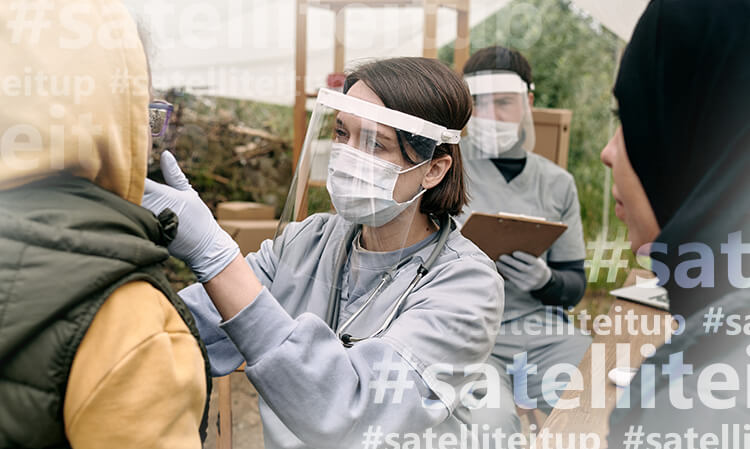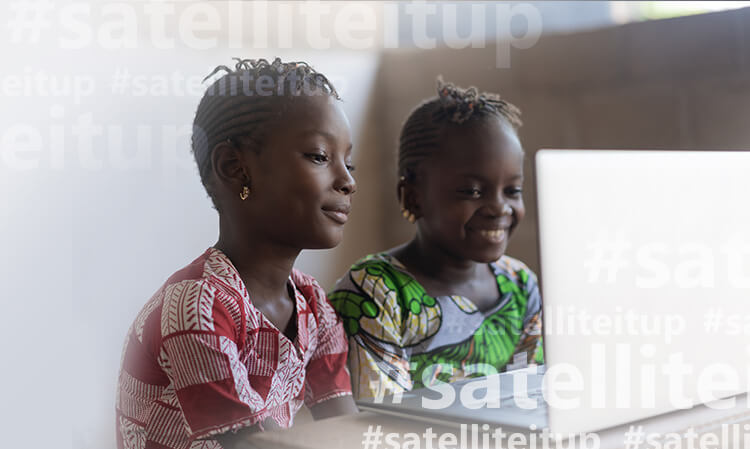The advent of Low-Earth Orbit (LEO) satellite connectivity is promoting the adoption of digital products and applications. Besides important considerations such as affordability and sustainability of a communications network, LEO satellite connectivity is also more efficient due to lower latency.
The global humanitarian sector stands to benefit the most from LEO network enabled cloud-based applications for quicker response times, access to reliable communications in underserved areas, and operational continuity on-the-move.
LEO satellite technology is forecasted to account for 40% of the global satellite communications market. The low latency of LEO networks enables modern cloud-based applications with better security and enhanced performance – critical for humanitarian missions. From videoconferencing and telemedicine to surveillance and remote maintenance, optimised applications deliver a better user experience, seamlessly over VSAT and back-up systems in the low-bandwidth environment.
Connectivity is critical for humanitarian missions. Operations have transformed with digitalisation and the advancement of satellite technology. Satellite connectivity means better coordination of humanitarian efforts, the safety of remote workers, the security of NGO’s assets and the reliability of long-term operations. It is also the sole gateway to closing the digital divide for vulnerable communities.
The introduction of a cost-effective LEO-based satcom service, e.g. Starlink and OneWeb, can unlock digitalisation in communities and remote areas where NGOs and humanitarian missions require connectivity for their day-to-day work. Coupled with network management services and value-added applications, LEO connectivity empowers the humanitarian sector to truly make a difference – especially in vast stretches of Asia, Africa, and the Middle East, where a reliable communications infrastructure for long-term deployments is an invaluable asset.

IEC Telecom has been serving the humanitarian sector for nearly three decades. Committed to increasing the operational efficiency of humanitarian missions in remote areas, IEC Telecom has consistently invested in dependable connectivity solutions for the humanitarian sector.
The recent launch of the Xpand Portfolio, powered by Starlink, delivers fast connectivity to the humanitarian sector. With speeds up to 220 Mbps, comparable to an average internet browsing experience over GSM, Xpand Portfolio is enhanced by resilient L-band backup and network management services over the OneGate system by IEC Telecom.
Leveraging the low latency of the Starlink network, Xpand can support any modern app in the field. In case the main link is down, the back-up environment offered by IEC Telecom’s solution can be equipped with a range of optimised applications, fully operating in a low bandwidth (under 90 Kbps). The range of services is geared to meet all mission-critical operations: from email exchange and videoconferencing to remote maintenance and surveillance.

From housing and food distribution to education, medicine and waste management, Xpand is an ideal solution for running a camp administration.
Equipped with a voucher system, Xpand enables a comprehensive welfare programme for the staff. Data packages can be distributed as part of a corporate CSR programme. For example, besides personal browsing, part of this allowance can be allocated towards real-time telemedicine and mental health support. Extra credits can be purchased by camp workers on-demand at a price comparable to GSM bundles. Vouchers can be issued by the camp administration via the centralised digital dashboard or purchased by the employees directly via an easy-to-use portal.
Vouchers can also be sold to contractors and servicing camps on an ad-hoc basis. This will help to speed up the operational cycle and also provide an immediate ROI opportunity for procurement.

With the help of Xpand Vehicular, mission trucks can operate akin to remote offices. This allows NGOs to significantly extend their reach and serve remote communities.
This is the ideal time to think outside-the-box and create new programmes and initiatives to empower those who were traditionally behind the digital curve. Use cases may include:
LEO technology is on its way to transforming the humanitarian response, and Xpand Portfolio is fully expected to be an indispensable asset in this process.